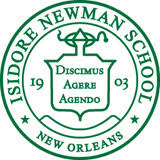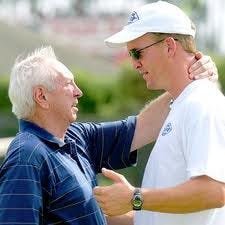The Best You've Never Heard Of Pt. V.
Odell Beckham, The Manning Brothers & Michael Lewis (author of Moneyball, The Big Short & Blind Side) all called him Coach Fitz.
“Privilege corrupts. You’re always doing what money can buy instead of what duty demands. You’re living your life as if nothing matters so much that you should suffer for it.”
Bill Fitzgerald to Michael Lewis after Lewis returned from a ski trip during baseball season.
Founded in 1903 for Jewish Orphans in New Orleans sits Isidore Newman School. This K - 12 nondenominational, private academy’s notable alumni include Cooper Manning ‘92, Peyton Manning ‘94, Eli Manning ‘99, Arch Manning ‘22, Odell Beckham Jr. ‘10, Michael Lewis (author of Blind Side, Moneyball & The Big Short) ‘78, and Walter Isaacson (founder of the Aspen Institute) ‘70. This private academy, highly regarded for its academics, is also well-known for its athletic prowess. To date, Isidore Newman has won 105 Louisiana state championships. For forty years (1974 - 2014) and an estimated 1500 games, Billy Fitzgerald played an integral role at Isidore Newman using sport as a classroom to develop young people.
Bill Fitzgerald Coaching Resume at Isidore Newman:
34 years as the Head Baseball Coach
Two State Championships
26 years as the Head Basketball Coach
551-221 Record
Five State Championships
Before he became ‘Coach Fitz’, Bill Fitzgerald, raised in New Orleans, was a two-sport athlete (baseball and basketball) at Tulare University. He was drafted 7th overall by the Oakland Athletics in the 1969 MLB draft, an organization he stuck with for five seasons.
Be it baseball or basketball, Fitzgerald was regarded for his intensity as an athlete. One basketball season at Tulane, Fitzgerald was tasked with guarding LSU’s Pistol Pete Maravich. Maravich lit up Fitzgerald for 66 points, but made the mistake of taunting Fitzgerald after a made basket. Fitzgerald was not having it and punched Maravich. Maravich dropped to the floor and the incident made the cover of Sports Illustrated.
After retiring, he was hired to teach and coach baseball at Isidore Newman. He made the transition from athlete to coach smoothly and did so without losing an ounce of the intensity he fervently competed with at Tulane. According to Peyton Manning, Fitz maintained the intensity as a coach, but appropriately, “ He’s so intense, but never laid a hand on anybody. As far as respect and admiration I have for the man, I couldn’t put it into words.” He entered Isidore Newman and his presence immediately put the student-athletes on notice. At 6’- 4” 220 lbs., he was physically formidable, but perhaps more intimidating was that the former catcher had no regard for fatigue, complaining or comfort.
“What is to give to light must endure burning.”
Victor Frankl
The stories of Fitzgerald’s intensity are legendary. After taking second place in a baseball tournament, Coach Fitz’s former players recounts an episode where he shared with the team his thoughts of second place by slamming the trophy into the ground, shattering it into remnants. Another player described how badly Coach Fitz hated losing when, after a loss that extended losing streak in 1976, the player was driving home through a bad neighborhood. At the time, New Orleans was ranked as a murder capital in the United States. He noticed a man walking in the darkness. It was Coach Fitz. He had a car, but decided to hoof it a few miles to his house. Perhaps this was Fitz’s way of cooling off before arriving at home.
He treated everybody equally. Whether it was the star of the team or the bench players, nobody was above breaking team rules. Not even Peyton Manning, who played basketball and baseball for Fitz. Manning was benched one game for skipping a basketball practice. The two exchanged words and almost came to blows. Manning quit basketball, but still played baseball. In his memoir, Manning attributes credit to Coach Fitz for developing his toughness.
“90% is not an A. 90% is an F. 100% is an A.”
Bill Fitzgerald
After a 15-2 drubbing, author Michael Lewis remembers a classic Coach Fitz episode when upon arriving back to school, he and his baseball teammates were ordered to stay. The objective was to slide headfirst into first base until they understood to stay down when he tells them. According to Lewis, the field was hard as asphalt and littered with glass, bottle caps and tiny, sharp remnants of who knows what. Kids were crying. They kept at it until Fitz called the post-game “practice” over. Uniforms were tattered, covered in mud, dirt and blood. They arrived back to their locker room and, while changing outfits, Coach Fitz informed them, “we’re not washing the uniforms. Not until we win.” For the next seven games, they wore those uniforms. Fans and opposing teams could be heard commenting on their Isidore Newman’s rag-tag look or their awful stench. The games got closer. Lewis and his teammates no longer cared about their appearance. Finally, they won. The lesson was not about winning and that’s what endured with Lewis and teammates.
“We listened to the man because he had something to tell us, and us alone. Not how to play baseball, though he did that better than anyone. Not how to win, though winning was wonderful. Not even how to sacrifice. He was teaching us something far more important: how to cope with the two greatest enemies of a well-lived life, fear and failure.” - Michael Lewis
Prior to Fitzgerald’s arrival at Isidore Newman, the athletics’ programs had experienced minimal success. Many wondered why Archie Manning opted to send Cooper, Peyton and Eli there. Isidore Newman was - and still is - regarded for its astute academics. While Coach Fitz is responsible for turning the lowly baseball and basketball teams into state champions, he is remembered for the life lessons he instilled in young men.
Fitzgerald’s office lacked any of the marks of success one might assume a successful coach would put on display. No trophies. No team photos. No laurels whatsoever, with the exception of a few family photos. Instead, his office walls were adorned with books. Lots of them. Lewis referred to Fitzgerald as a “closet intellectual”. Quotes from Victor Frankl, Mark Twain and Aesop were scattered throughout his space as well, all driven with one goal in mind: how to tap more deeply into his players so that they can be comfortable with the uncomfortable. He was preparing them to become better teammates, friends, sons, husbands and fathers. In a culture that lacks the rite-of-passage so many of those before had endured, Isidore Newman had their own rite-of-passage and that was playing for Coach Fitz.
Unfortunately, after the millennium, the athletic culture shifted at Isidore Newman. It was a microcosm of what had developed across the U.S. It was not the young men he had worked with who changed, rather, their parents. Complaints from parents increased. Kids skipped practice to go on ski trips, beach vacations or abroad and, with Coach Fitz, there were consequences for doing that. In 2004, eight of his baseball players got caught drinking at a party, two of them were his captains, so he followed protocol and suspended them each for two weeks. At practice, he told the team, “I’m going to run you until you hate me.” In the weeks following, parents called the school complaining that there kids were not playing. Coach Fitz did not budge. He even played a game with nine players (the minimum amount needed for a game). The parents felt the $14,000 per year tuition entitled their children to bucking Fitz’s rules. When the punishments were dolled out, they never went to directly to Coach Fitz; instead, they went to the school’s headmaster to set up a “meeting”. Prior to the early 2000s, never once did Coach Fitz get called into the headmaster’s quarters.
In 2003, amidst the parental challenges, an Isidore Newman Alum reached out to the school to rename the school’s gym after Coach Fitz. What the alum did not find was a bunch of disgruntled alumni who loathed the man. Instead, he found hundreds of former players and parents of players who shared stories of the impact Fitz had on them. “Coach Fitz did all the hard work” was the common sentiment shared. The donations poured in and the gym was aptly named after Coach Fitz.
Challenges like parental interference, excessive administrative oversight and general oversensitivity have only exacerbated since Fitz’s early days as a coach. The same can be said for education. It troubles me to think that current and future generations of athletes will not get to be instructed under the tutelage of leaders like Coach Fitz.
The helicopter parents of yesterday have been replaced by snowplow parents today. These are the folks who remove obstacles that cause discomfort so that their child avoids actual challenges and evades real consequences. A culture that fears failure is a culture that will fail. Why? Well, if a culture fears failure then it also fears high standards. Failure is part and parcel in upholding high standards. Our young people need to learn how to reinterpret failure as something that is not fatal, nor final. We can blame social media or screen time for this, but it comes down to personal responsibility, something all great leaders drill into their athletes.
Personally, I have seen firsthand (and continue to) the over influence of parents. Should parents care about the men and women coaches leading their children? 100%. But there is a line and, culturally, we have blurred that line. Should we continue on this trajectory, we are never going to get a Jim Steen, Perry Reese, Anson Dorrance, Biff Poggi or Bill Fitzgerald in coaching. They do not want to be hamstrung by parents who claim to know better. They want to help young people grow into mature, contributing adults. Hopefully, more individuals will continue to illuminate the many fine examples of what it means to be a coach.
Resources:
https://servetolead.com/coach-billy-fitzgerald-an-ecosystem-of-excellence/
https://www.nytimes.com/2004/03/28/magazine/coach-fitz-s-management-theory.html








